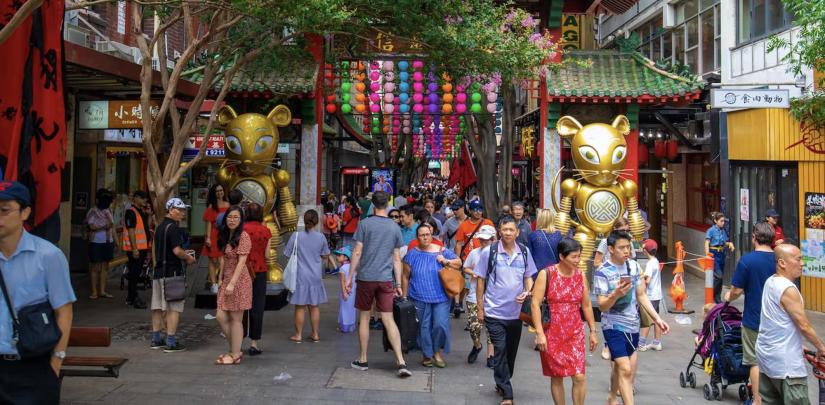Early this month, the Daily Mail published a story online implying three Chinese men taking photos at the Avalon Airshow in Melbourne were spies.

For many in the various Chinese-Australian communities, reading speculations about whether there will be a war with China is a constant source of anxiety, fear and uncertainty. Photo: Shutterstock.
After complaints and an open letter condemning the paper for racially profiling the Chinese communities and throwing around baseless accusations, the story disappeared from the Mail’s site without explanation.
Then The Sydney Morning Herald’s Red Alert series hit people’s WeChat feeds, claiming a war with China could happen within three years.
The Daily Mail, like many other media outlets, possibly believed it could make insinuations of spying with impunity, since many of its intended readers would likely be sufficiently primed to accept such narratives as common sense.
In fact, a 2022 poll reveals: “Just over four in 10 Australians (42%) say ‘Australians of Chinese origin can be mobilised by the Chinese government to undermine Australia’s interests and social cohesion’.”
Commenting on the Mail’s “spy” story, La Trobe University’s Nick Bisley tweeted, “Yep, this is what happens when the red menace crap is thrown around carelessly”, apparently connecting it with the Red Alert series. Several foreign affairs specialists have called the series “pretentious”, “hyperbolic”, “irresponsible” and “implicitly racist” reporting.
Similarly, a survey I conducted recently on behalf of UTS’s Australia-China Relations Institute (ACRI) points to another kind of fear. The respondents were 500 migrants from mainland China. A key aim was to understand how their reading of Australian media stories about China and Chinese-Australian communities affected their sense of belonging.
A full analysis of the survey will be detailed in a forthcoming ACRI report. But one survey question was: “To what extent would you be concerned about your own wellbeing and that of the Chinese-Australian communities if Australia were at war with China?” More than half (54.68%) said they were “extremely concerned”. Another 36.10% said they were “quite concerned”. Only around 9% said they were not concerned.
When juxtaposed, these two sets of survey figures raise a “red alert” of another kind: regardless of whether a war with China will ever eventuate, Chinese Australians are rapidly becoming the first casualties of persistent war talk.
Yet, while there has been a highly polarised response to the Red Alert series, very few commentators on either side have thought much about how these publications affect Chinese Australians, especially first-generation migrants from mainland China. As Yun Jiang observes:
Among all talks about preparation for a war, preparing the population for a potentially divisive society is not part of it.
Mainstream media outlets and commentators seem to concern themselves even less with the emotional and psychological impact such media stories have almost daily on Australian citizens with Chinese ancestry.
Our recently published study, based on three years’ longitudinal research of Chinese-language digital and social media in Australia, has revealed many first-generation Mandarin speakers here experience a high level of internal conflict in relation to mainstream Australian media coverage of China. Funded by the Australian Research Council, the study found these migrants, who by 2021 numbered over half a million, were caught in an increasingly hostile relationship between the two countries.
The study also found most respondents did not identify with the propaganda of Chinese state media. However, they were increasingly disillusioned with the Australian English-language media’s interest in reporting on China with fairness and balance.
For many in the various Chinese-Australian communities, including mainland migrants, reading speculations about whether there will be a war with China within six months, two years or three years is not a matter of neutral speculation. It is a constant source of anxiety, fear and uncertainty.
The specific nature of their anxiety and fear became clearer after I conducted in-depth interviews with 20 individuals in the Mandarin-speaking community about their media consumption habits.
First, many of these interviewees wondered, with a growing sense of alarm, what would happen to them if war did happen. One middle-aged female accountant said:
During WW1, many German Australians were interned in Australia. During WW2, many Italian migrants were interned. Sure, ours is now a very multicultural society, but who can assure us that this won’t happen to us when war breaks out? When war happens, rationality may go out the window. Look at what happened to Jewish people. I’m really worried. My daughter recently came back from school and asked me if it’s true that China will invade Australia.
Second, many interviewees expressed the fear that this loose talk about war in the media could make war more likely. A male interviewee who works in a university said:
A few years ago, if someone mentioned a war between Australia and China over Taiwan, it would have sounded preposterous. But now, people no longer find such talk fanciful. I believe the media normalises war-mongering. It upsets me very much each time I read such predictions.
Third, my interviewees, like many other Chinese Australians – and Asian Australians generally – know too well they will be more vulnerable to random racist attacks in public, and treated as potential agents of a hostile country, as long as talk of war persists in the media.
It is for precisely this reason that the Daily Mail’s “spy” story sends a chill down the spine of many people and has aroused widespread condemnation from Chinese-Australian communities. As one interviewee said:
These days, it doesn’t take too much to provoke a racist. All it takes is seeing someone who looks Chinese.
Wanning Sun, Professor of Media and Cultural Studies, University of Technology Sydney
This article is republished from The Conversation under a Creative Commons license. Read the original article.

